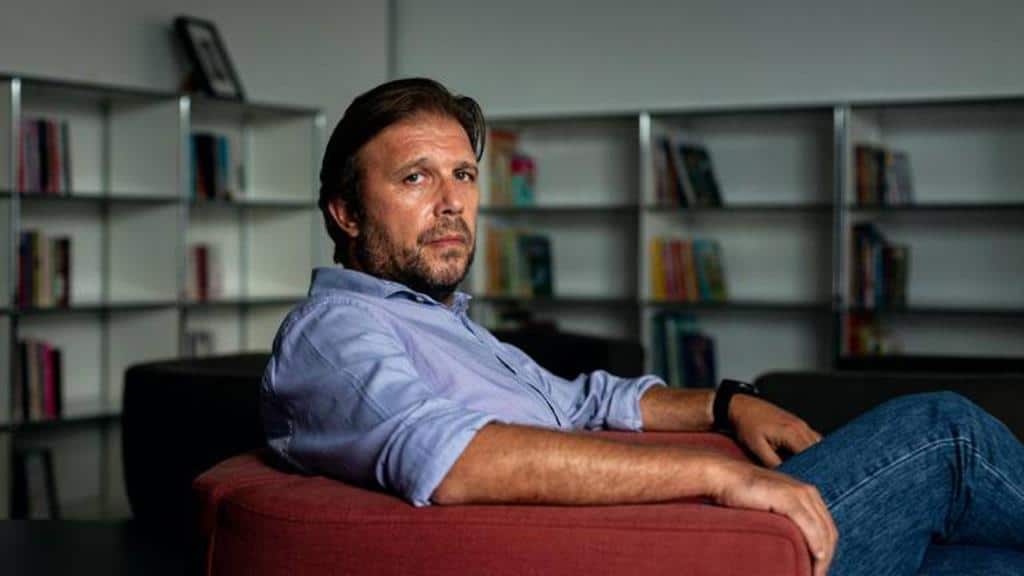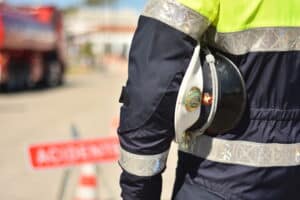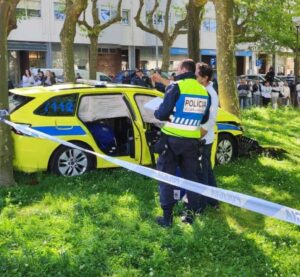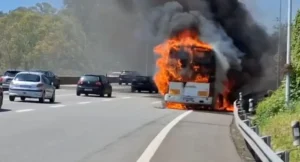Pedro Sobral was cycling on Avenida de Índia; driver gave himself up four hours later
There has been an outpouring of shock, sadness and tributes today following the hit-and-run death early this morning of Pedro Sobral, 51 – president of APEL, the Portuguese association of publishers and booksellers, and director of publishing company LeYa.
Mr Sobral was hit as he cycled along Avenida de Índia in Belém, in the direction of Algés. First responders declared his death at the scene, at around 8am. At the time, there was nothing known about the vehicle, except that it was “likely to have some frontal damage due to the impact”. According to reports, Mr Sobral may have been hit as early as 7.20am (this is the time mentioned in an early report, called in by an eye witness who described an ‘inanimate man on the ground’.
As the story developed, and Mr Sobral’s identity became known, the driver presented himself at Carcavelos police station in the company of his lawyer.
The driver, due to face initial questioning by a magistrate, has been allowed to return home.
Meantime, the reaction to this tragedy has gone on through the day, and throughout social media.
LeYa has said in a statement that the loss of its founder represents “insurmountable damage not only for all those who worked closely with him, but also for those connected to the book sector, namely publishers, writers, booksellers and readers”.
Minister for Culture Dalila Rodrigues has expressed her shock and profound sadness for “an essential partner for the Culture ministry. Recognised both for his critical and entrepreneurial spirit and for his dynamic openness to dialogue in the publishing and bookselling market, Pedro Sobral will be remembered for his career dedicated to books and the importance of reading habits in our country. My deepest condolences to his family and friends”.
Many friends have expressed their grief over social media. Even the office of President Marcelo has marked the exceptionally sad day with a note on the official website of the presidency, saying: “It was with great shock that the President of the Republic learnt of the tragic death of Pedro Sobral this morning in Lisbon. Pedro Sobral did a remarkable job as President of the Portuguese Publishers and Booksellers Association and will be greatly missed by the book sector in particular and Culture in general. The President of the Republic remembers, in particular, with deep gratitude, the partnership with APEL in the Belém Book Festival, in which Pedro Sobral was one of the main organisers”.
The truth is that this is yet another ‘death of a cyclist’ in the capital. They come every year – and bizarrely perhaps, this awful tragedy took place close to the spot where a young pregnant cyclist was killed in 2021.
One person reacting to today’s sadness, and who did not know Pedro Sobral personally, has given his thoughts on the situation:
“Anyone who uses a bicycle as their daily means of transport – which is the case with me and my wife – quickly learns several lessons:
1- life is fragile and ephemeral;
2- in Portugal, people drive in a criminal fashion;
3 – nobody cares;
4- you should not read the comments boxes on news stories involving cyclists.
“Allow me to get a few things off my chest.
“I did not know Pedro Sobral, whose death I regret, but I know the area where he was barbarically murdered very well. Yes, murdered – with a weapon accessible to millions of Portuguese, called a car.
“It is a stretch of road where it is very easy to reach very high speeds and where a cycle path has been planned for several years. Why haven’t they built it if this avenue is used by hundreds of cyclists every day?
“The person who murdered Pedro fled the scene of the crime and went to the police four hours later with a high level of alcohol in his blood. I hope that justice will punish him exemplarily, but I doubt that it will, given his track record with this type of offence.
“Road traffic offences are among the most common in Portugal – they are considered a public health problem.
“Car accidents kill 600 people every year, making us one of the worst countries in Europe in this respect.
“We need to put an end to this. The police have to start with the basics: not condoning offences and the courts have to start passing exemplary judgements on those who kill on the roads.
“And we need to publicly censor the discourse that subscribes to the thesis that the roads are no good, the signs are badly placed and that speed cameras are there to extort money from the people.
“No, my friends, driving is appropriate and speed cameras are there to punish those who don’t comply and dissuade those who want to prevaricate. In other words, speed cameras defend us against the fate of being hit by a killer.
“If there had been a speed camera on this Lisbon highway, Pedro might still be alive.
“Or a cycle lane, but that’s a different story….”
natasha.donn@portugalresident.com




















